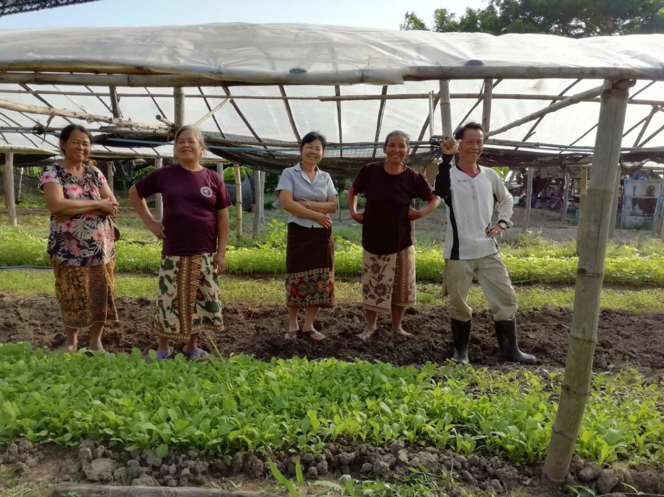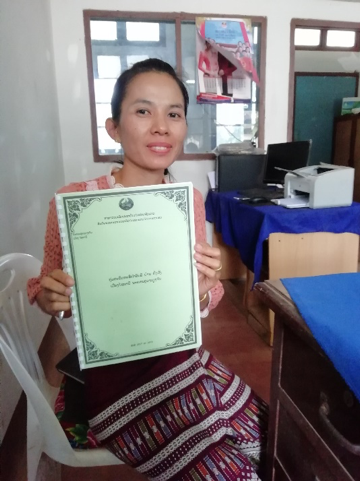
Organic produce taking root in consumers’ minds
– January 2019 –

As the Lao economy grows, so does demand for healthy food like organically grown fruits and vegetables. “We started a group to grow organic vegetables around 2012 and we tried again in 2015 with DAFO [government] support,” says
The Tongmang group is one of the latest of a growing number of farmer groups and one of the more successful. While their sister group in Nongtae village was the first organic vegetable group in Laos, set up in 2009, the Tongmang group was the first to get an official certificate in organic vegetable production from the Ministry of Agriculture Standards Division. CDAIS works with both groups and while there are many differences, they are both working hard to meeting the increasingly high standards expected by consumers in urban centers like Vientiane.
Both groups were using a similar ‘internal control system’ (ICS) to check quantity and quality and this was working reasonably well. In 2018, the Ministry of Agriculture Standards Division introduced a Participatory Guarantee System (PGS) for specific products at a training workshop in Sengkham and Houaphan Provinces. In Nongtae and Thongman only the group leaders and a few members could attend, creating some confusion among group members in how to use the PGS, so they organized their own workshop in April. Attended by 37 farmers, CDAIS facilitators were also asked to provide backstopping support for exercises like practice interviews using role playing. The workshop cleared up much of the confusion and was a good opportunity to share and exchange information.
While membership in both groups has remained stable, both have increased the volume of production, and in Tongmang, the cooperative land area they work on. The Tongmang group has extended their value chain to include chickens and ducks and are planning to add goats, invested in new equipment for making compost and organic fertilisers and pesticides using their group fund, growing seed in the rainy season when sales are slow and drafting a training plan to improve their techniques for growing in the rainy season. They have also been working closely with DAFO to complete the final report on their group. This is a requirement for their registration with DAFO as an official group and makes them eligible for technical and other government support. It also helps with access to credit and will be an important document to help them achieve their goal to become an official cooperative.
“After working together, group leaders and members are more comfortable about coming to DAFO and asking for support. They are also coming with more ideas for the support they want.”

Slow and steady wins the race
The Nongtae group has fewer changes to report but that doesn’t mean they are not doing well. Mr. Khamphou is a strong leader and works hard to overcome some of the difficulties his members face. For example, members in Nongtae grow on individual household plots which are widely scattered and this makes it difficult to share tools and equipment and to come together for collective tasks like making compost and weeding. Some Tongmang members have said they would like to work their own plots also and Mr. Khampou has valuable insights to share on how they can make that work. “We are different,” says Mr. Khamphou, “but we can learn from each other.”
“We are different,” says Mr. Khamphou, “but we can learn from each other.”
This is an update of an earlier Story of Change, ‘Sowing the seeds of an organic and nutritious future’ published onwww.cdais.netin December 2017.
Prepared by Lampheuy Kaensombath, the national CDAIS coordinator (lampheuyk@gmail.com,+856 020 2829 9751), and Khamla Sengphaxaiyalath, the CDAIS national innovation facilitator for the pig production niche (khamla.s772@gmail.com, +856 020 2333 6020).
Organic vegetable production one of the five innovation niche partnerships in Lao PDR being developed as part of the


The views expressed herein can in no way be taken to reflect the official opinion of the European Union. © 2019
